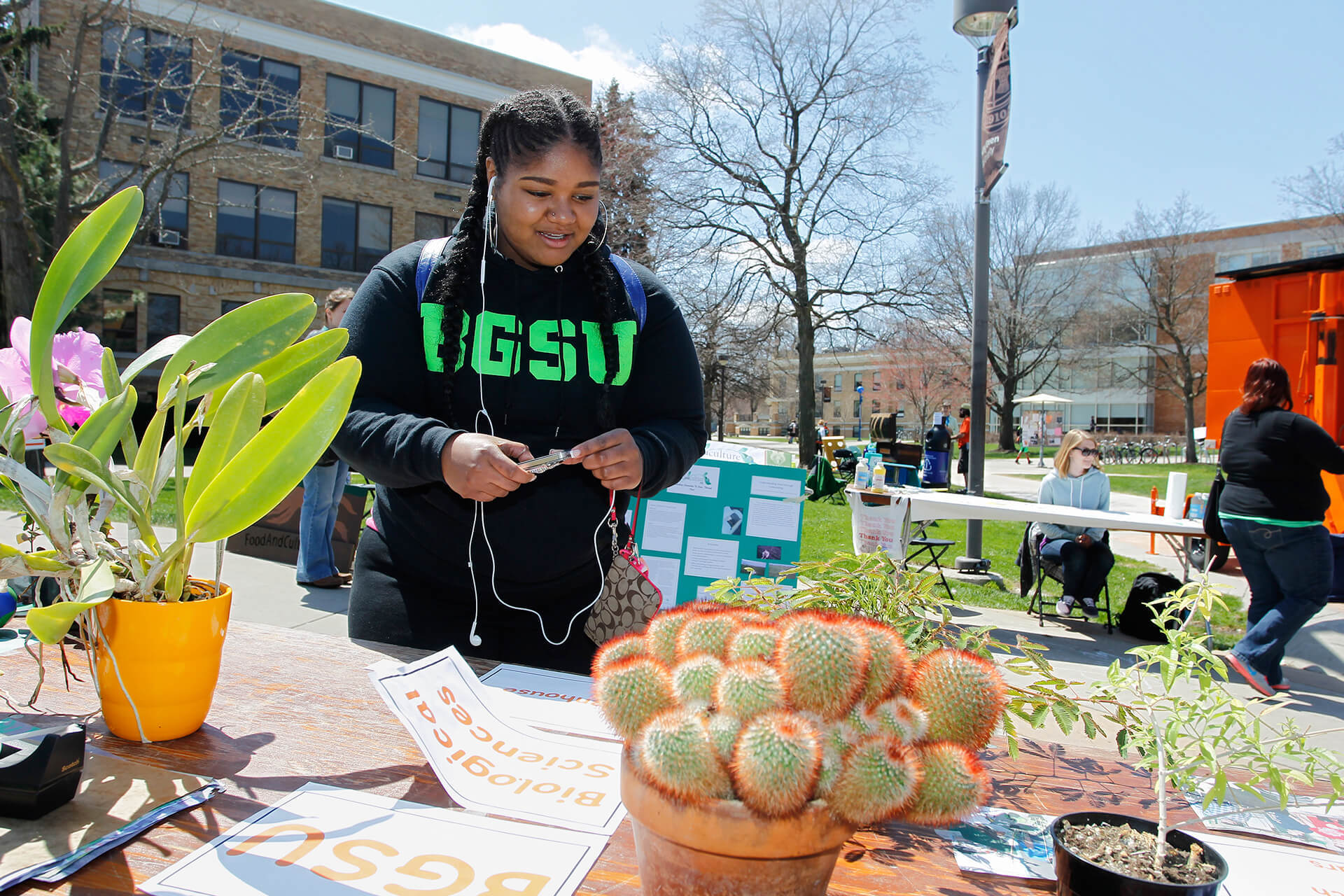#1 public university in Ohio for student experience
The Wall Street Journal

Bachelor of Science (B.S.)
Minor
Environmental Science
We live in an era of unprecedented environmental challenges. But we’re also living in a time of unparalleled scientific advancement.
A B.S. in environmental science from Bowling Green State University will give you the knowledge, skills and holistic perspectives to help build a cleaner, sustainable and more resource-efficient future.
The BGSU environmental science program has been focused on career, experiential and service learning since its creation more than 50 years ago. We will teach you to examine the interrelationship between human activities and the biophysical world and assess and address environmental conflicts.
Our curriculum integrates concepts from many disciplines – biology, chemistry, geology, physics, economics, geography, sociology, political science, data analysis and more). This interdisciplinary approach expands your career options.
The School of Earth, Environment and Society (SEES) also offers many minor degrees. These are open to students in any major.
Why study environmental science at BGSU in Ohio?
- Outstanding faculty. Learn from standouts in their respective fields who are engaged with cutting-edge environmental research and dedicated to student success.
- State-of-the-art laboratories and equipment. BGSU is among the best-equipped environmental science programs in the U.S. We have committed substantial resources to acquiring and maintaining teaching and research facilities, laboratories and equipment.
- Strong interdisciplinary focus. You’ll get a solid foundation of environmental courses and a broad knowledge base in many diverse fields. This helps prepare you for a wide range of careers.
- Data-driven approach. Learn how to analyze environmental data, model climate impacts and develop meaningful solutions to complex, serious issues.
- Internships and industry connections. Experiential learning is key to our environmental science degree program. Fieldwork and research allow you to study real-world environmental challenges in Ohio’s forests, wetlands and waterways. Our students land amazing internship opportunities in the public and private sector – from the Great Lakes to Alaska.
- Study abroad. BGSU offers hundreds of study abroad academic programs in more than 50 countries during the summer, semester and academic year. Explore international internships, field study, undergraduate research, community service and teaching opportunities.
- Green priorities. The BGSU Office of Campus Sustainability exists as part of our sincere commitment to encourage sustainability in everyday life. It includes a strategic plan to achieve institutional carbon neutrality by 2040. Active efforts are aimed at reducing on-campus emissions, minimizing waste, conserving resources and maximizing education and outreach.
- Get hired! Our program is career-focused. Graduate with the knowledge and skills needed to stand out in the job market. Demand – and salaries – for environmental science graduates are rising.
#1 university in Ohio for career preparation
The Wall Street Journal
Career - what can you do with an environmental science degree?
A shortage of environmental scientists spells career opportunities for graduates with a B.S. in environmental science from BGSU. Our graduates stand out as leaders with a unique combination of skill sets that empower them to be effective environmental decision makers.
Environmental science degree jobs exist in the public, private and nonprofit sectors. Our graduates make a good living doing what they love – improving the health of Earth’s ecosystems and communities for generations to come.
- Environmental scientist. Investigate environmental hazards, pollution and sustainability solutions.
- Environmental consultant. Work with businesses and government agencies to ensure compliance with environmental regulations and best practices.
- Ecologist or conservation scientist. Study and protect natural ecosystems, wildlife and biodiversity.
- Water quality specialist. Safeguard water resources through testing and treatment strategies.
- Renewable energy analyst. Help develop wind, solar and alternative energy solutions.
- Environmental health and safety specialist. Ensure public and workplace safety from environmental risks.
- Urban sustainability planner. Design greener, cleaner cities and ensure communities grow in ways that are both eco-conscious as well as economically sound. Prove that progress and preservation can co-exist.
Career paths
- Biological and chemical quality monitoring
- Conservation biology
- Energy systems design
- Environmental remediation
- Geospatial systems analysis
- Natural resource management
- Sustainable management
- Wildlife protection and preservation
- Watershed management
Quick Facts from the Bureau of Labor Statistics
Curriculum
Finding solutions to regional, national and global environmental problems means considering factors and impacts from every angle. That’s why the BGSU environmental science bachelor’s degree focuses on much more than natural science. The curriculum purposely incorporates perspectives from many other areas of study.
The program starts with foundational coursework in the natural sciences, mathematics and specialized environmental classes. Then we include additional courses in areas such as social sciences, communication, business and political science.
Environmental science majors acquire expertise in an environmental area that aligns with their career goals, including:
- Sustainable management
- Environmental restoration
- Watershed management
- Geospatial analysis
- Environmental education and interpretation
Students majoring in environmental science are required to complete a minor.
Graduates of the environmental science B.S. will be able to:
- Apply critical thinking, problem-solving skills and methodologies from natural sciences to address environmental problems
- Propose and successfully complete a practical, experience-based internship or independent research project
- Develop effective oral and written communication skills to articulate issues in environmental science and the broader field of environmental studies
- Analyze spatial and non-spatial data to explain patterns and relationships between human activity and the natural environment

Sample courses
- American Environmental History
- Energy Science
- Environmental Geology
- Environmental Problems
- Environmental Field and Laboratory Methods
- General Botany
- Geospatial Science
- Water Quality
- Hydrology
- Population and Community Ecology
#1 public university in the Midwest students would choose again
The Wall Street Journal
Facilities, laboratories and equipment
BGSU offers students in the School of Earth, Environment and Society every tool they need to succeed. We have invested substantially in extensive research and teaching equipment and instrumentation.
The school’s facilities span five buildings on campus (Overman Hall, Memorial Hall, Hayes Hall, Moseley Hall and Math Science). Students have access to geophysical equipment, surveying equipment, microscopes, field hydrology equipment and more.
We also have numerous specialized laboratories, including:
- GeoInformatics Laboratory (GIL)
- G-ECO Remote Sensing Lab
- Paleontology laboratory
- Aqueous and Terrestrial Geochemistry Laboratory
- High temperature and pressure mineral synthesis laboratory
- Sedimentary processes laboratory
- Sediment core lab
- Rock preparation facilities
This minor (21-25 credits) is popular with biology students but open to students in a range of majors – driving home the holistic nature of environmental issues.
Students get a broad foundational understanding of the natural sciences, the environment and ecosystems by taking courses like:
- Conservation Biology in Practice
- Wildlife Biology
- Water Quality in the Environment
- Energy Science
- Great Lakes Ecosystems
This minor (21-22 credits) is for those interested in learning how to balance the needs of human society and modern life with environmental conservation and sustainability.
Consider critical sustainability issues from varying perspectives (biology, economics, environmental studies, history, philosophy, political science, etc.), and draw from these areas to optimize problem-solving strategies.
Sample courses include:
- Environmental Ethics
- Weather and Climate
- Environmental Justice
- Urban Economics
- Environmental Politics and Policies
- International Health
This minor (23-24 credits) encompasses many areas of study within the School of Earth, Environment and Society and beyond – biological sciences, chemistry and political science.
Students learn about water cycles, the world’s fresh water supply/related issues and relate their knowledge to water management, policy and practices.
Sample courses include:
- Earth Environments
- Water Resources and Issues
- Introduction to Hydrology
- Water Quality in the Environment
- Great Lakes Ecosystems
- Environmental Planning
- Groundwater Hydrology
This minor (17-20 credits) provides broad introductory content and advanced courses in a variety of interest areas. The minor emphasizes service-learning activities and offers opportunities to get involved with the sustainability efforts of local park services and environmental nonprofits.
Sample courses include:
- Earth Structure and Tectonics
- Economic Geology
- Geophysics
- Groundwater Hydrology
- Paleoclimate
- Soil Sciences
This flexible, 21-credit minor fits the needs of students in many majors who are eyeing careers where fundamental geospatial skills would be an asset.
Students learn to use geospatial technology used in the field to address real-world problems, such as the Geographical Information System (GIS), Remote Sensing (RS) and other technologies.
They also learn to collect, store, organize, manage and analyze geospatial data in courses such as:
- Geographic Information Systems
- Remote Sensing
- Advanced Cartographic Techniques
- Business Analytics
- Programming Fundamentals
- Database Management Systems
This 21-credit minor offers students a broad overview of the discipline. It is ideal for students in any major that is complemented by intensive examination of the history of life on Earth.
Courses include:
- The Human Fossil Record
- Earth Environments
- Vertebrate Paleontology
- Paleoclimate
- Geologic History of Dinosaurs
There is also a paleobiology specialization through the B.S. geology program.
The environmental science program is part of the School of Earth, Environment and Society in the BGSU College of Arts and Sciences.
Accreditation
Bowling Green State University [BGSU] is accredited by the Higher Learning Commission. BGSU has been accredited by the Higher Learning Commission since 01/01/1916. The most recent reaffirmation of accreditation was received in 2022-2023, with our next reaffirmation of accreditation scheduled for 2032-2033. Questions should be directed to the Office of Institutional Effectiveness.
Request Information
Updated: 06/11/2025 04:28PM

